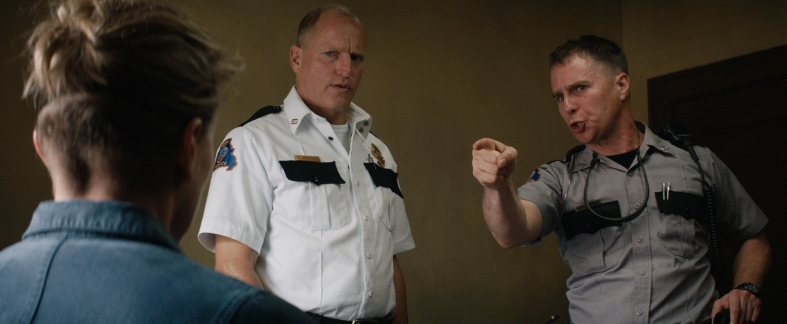By Casey Campbell
Grief is often a destructive force, bearing down with an unceasing desire to wither your will. It leads many on a downward spiral into the deepest depths of their being, sometimes creating a different person altogether. For Mildred Hayes (Francis McDormand), grief is a motivator. It gives her hope, when all is lost. It strengthens her desire to stand up and fight for something, when everyone else is ready to give up.
For Hayes, the motivation is materialized as three billboards displaying a message outside of her town of Ebbing, Missouri. Three Billboards outside Ebbing, Missouri is an oftentimes bleak, fleetingly hopeful, and always human film from Martin McDonagh. It presents a conflicting narrative, not because of time-hopping or cryptic imagery, but because of the heartbreaking humanity displayed throughout. The complexity of the film stems from it’s characters. There are some you pine hopefully for, and others you despise, yet the connecting tissue between the two is their consistent sense of understanding. You understand why certain characters are against Hayes’ new billboards, even if you disagree with their stance. You understand Hayes’ sense of urgency even if it sometimes gets her in trouble with the law.
Months after her daughters brutal murder, Mildred becomes fed up with the police’s inactivity in response to her daughter’s case. Passing through the outskirts of town, she purchases the space on the billboards to display a message, directly calling out the towns beloved Chief of Police, William Willoughby (Woody Harrelson). As the billboards pick up publicity, she faces blowback from both citizens and law-enforcement from Ebbing.
McDormand plays Hayes as strong, yet distant and broken; she’s a woman fighting for a reason to keep living, despite adversity. All she wants is for her daughter’s case to be solved. The publicity she gains causes Willoughby to look back at the case, though for all the good it brings, it shines public disdain on the wrong thing. People in town focus on the billboards, where they should be focusing on the murder that prompted the signs.

Frances McDormand, Woody Harrelson, and Sam Rockwell in ‘Three Billboards.’ Courtesy of Fox Searchlight
The public response to the billboards is frustrating, yet oddly understandable. The police chief is a good man, dealing with his own baggage. From an outsiders perspective, Hayes seems to be blaming the chief for the inaction with the case. But the movie is never one-sided. Even the “villain” in the film, a violent police officer played miraculously by Sam Rockwell, is a complex human with desires and aspirations.
The writing and direction by McDonagh is pitch perfect here, fully utilizing his brand of uniquely bleak yet humorous situations to paint a story unlike any I’ve seen before. His previous films In Bruges and Seven Psychopaths contain the same themes and tone, but he’s perfected his craft with Three Billboards.
If there’s one takeaway from Three Billboards, it’s to never give up. Never give up on yourself, nor on those around you. Sometimes, clarity comes from the most unexpected of places.

One thought on “Hope, grief, and moving on, in ‘Three Billboards’”